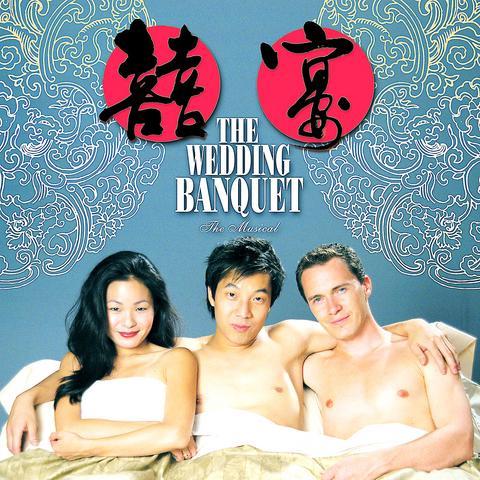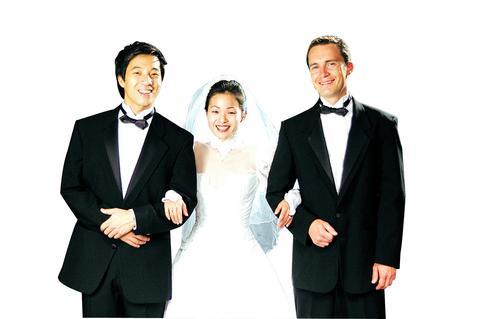He might have been born to Taiwanese parents in the US and never resided in Taiwan for periods longer than six-months, but Welly, or Wellington as it appears on his birth certificate, Yang (
Graduating from the very unmusical department of political science and international relations at Columbia University, Yang's career in singing was inspired by his grandmother. As a Taiwanese opera singer she taught him all the tricks of the trade that have led to Yang becoming one of the US's leading Asian-American stage performers.
Making his Broadway debut a decade ago in Miss Saigon as Thuy, the evil North Vietnamese Army officer, Yang went on to receive critical acclaim in both Europe and the US for his work in the John Adams/Peter Sellars' hit Ceiling Sky and the Cole Porter adaptation of Aladdin.

PHOTO COURTESY OF SIRAYA THEATRITAL
Founding the Second Generation theatre company in 1997, Yang has become one the few performers and writers to concentrate on bring Asian American stories to stages and audiences worldwide.
For his latest production Yang has, as he says, "returned to his roots," with a musical adaptation of Ang Lee's (
"In many ways it couldn't make more sense," said Yang. "I go back there to perform quite a lot these days and I have a passion for Taiwan and all things Taiwanese." Obtaining the rights to the production roughly four years ago, Yang and popular Broadway producer, John Tillinger, whose credits include The Sunshine Boys and Judgement at Nuremburg, set about adapting the script two years ago; something that proved both a complex and lengthy process.

PHOTO COURTESY OF SIRAYA THEATRITAL
"It was turned in to a movie 10 years ago, but the script was written about 16 years ago. So it was a bit dated in some ways, especially when dealing with the ways in which people viewed homosexuality at the time," explained Yang. "Obviously we had to adapt certain aspects of it quite a bit so as to bring it up to date with the way sex and homosexuality are looked at now."
Because of changing views and attitudes, Yang and Tillinger have changed parts of the original plot. The score adds more of a sense of New York to the narrative and aspects of American and Asian life styles that were not part of the original story line have also been incorporated.
These include a gospel tune, a huge tai chi number performed by the entire cast and several other surprises. Written by Woody Pak, the score, according to Yang, takes the story to new and previously unexplored areas.
Not wishing to give too much away, however, readers who have seen the original movie are going to be pleasently surprised rather than disappointed by Yang's revamped musical version of The Wedding Banquet. Along with music there is also a slightly different ending to the show.
"The questions left unresolved at the end of the film have been resolved and it does end a little differently," admitted Yang. "If you were moved by the film, then you'll be wonderfully surprised by the musical."
Set to premier in Taipei next Friday, the lead roles for Yang's latest production are taken by a couple of the musical scenes' leading lights. Simon is played by Tyley Ross, a young performer who was hand picked by The Who's Pete Townshend to play the lead role in the band's rock opera Tommy when it debut in Canada. And Wei Wei is played by Ma-Anne Dionisio, who received a Dora Mavor Moore Award nomination for best Actress in a Musical for her performance in Miss Saigon.
Unlike other big productions, Yang's The Wedding Banquet will unfortunately not be touring nationwide. In addtion to Taipei, the show's only other performances will be in Tainan.
While some might consider the small southern city an odd choice to stage what many hope will one day become a Broadway hit, Yang opted for Tainan for two special reasons. As well being the hometown of Ang Lee, Tainan is also his parents' place of birth.
"We were asked to perform in other cities, but time constraints and prior engagements have meant that we only have time for a certain number of performances in Taiwan," said Yang. "Which is a pity, but at present there's nothing we can do about it."
After its world premier in Taiwan, the show will move to Singapore and then onto Hawaii and Seattle. Talks are being held to take the show to Hong Kong in the near future.
Although there are currently no immediate plans to bring the show to Broadway, Yang has been talking to several well-known Broadway producers, all of whom have shown a great deal of interest in his The Wedding Banquet.
"There are producers out there who are interested in staging it there, but it will take quite a bit of adapting," Yang told Taipei Times. "Our current budget is US$1.5 million and most of that goes on airfares. To bring it to Broadway we'd be looking at at least US$10 million and a much larger cast. But that is our goal."
Welly Yang's musical adaptation of The Wedding Banquet will premier at Taipei's Novel Hall (新舞臺) on Friday, Aug. 8 at 7:30pm. The Novel Hall is located at 3-1, Songshou Rd., Taipei (台北市松壽路3-1號). Tickets cost between NT$500 and NT$2,500 and are available from ERA Ticketing Outlets nationwide or direct from the venue.
The The Wedding Banquet will move to Tainan on Aug. 16 and 17, where it will play at the Tainan City Arts and Performance Center (

Late last month Philippines Foreign Affairs Secretary Theresa Lazaro told the Philippine Senate that the nation has sufficient funds to evacuate the nearly 170,000 Filipino residents in Taiwan, 84 percent of whom are migrant workers, in the event of war. Agencies have been exploring evacuation scenarios since early this year, she said. She also observed that since the Philippines has only limited ships, the government is consulting security agencies for alternatives. Filipinos are a distant third in overall migrant worker population. Indonesia has over 248,000 workers, followed by roughly 240,000 Vietnamese. It should be noted that there are another 170,000

Enter the Dragon 13 will bring Taiwan’s first taste of Dirty Boxing Sunday at Taipei Gymnasium, one highlight of a mixed-rules card blending new formats with traditional MMA. The undercard starts at 10:30am, with the main card beginning at 4pm. Tickets are NT$1,200. Dirty Boxing is a US-born ruleset popularized by fighters Mike Perry and Jon Jones as an alternative to boxing. The format has gained traction overseas, with its inaugural championship streamed free to millions on YouTube, Facebook and Instagram. Taiwan’s version allows punches and elbows with clinch striking, but bans kicks, knees and takedowns. The rules are stricter than the

“Far from being a rock or island … it turns out that the best metaphor to describe the human body is ‘sponge.’ We’re permeable,” write Rick Smith and Bruce Lourie in their book Slow Death By Rubber Duck: The Secret Danger of Everyday Things. While the permeability of our cells is key to being alive, it also means we absorb more potentially harmful substances than we realize. Studies have found a number of chemical residues in human breast milk, urine and water systems. Many of them are endocrine disruptors, which can interfere with the body’s natural hormones. “They can mimic, block

Pratas Island, or Dongsha (東沙群島) had lain off the southern coast of China for thousands of years with no one claiming it until 1908, when a Japanese merchant set up a facility there to harvest guano. The Americans, then overlords of the Philippines, disturbed to learn of Japanese expansion so close to their colony, alerted the Manchu (Qing) government. That same year the British government asked the Manchus who owned the island, which prompted the Manchu government to make a claim, according to South China Sea expert Bill Hayton. In 1909 the government of Guangdong finally got around to sending